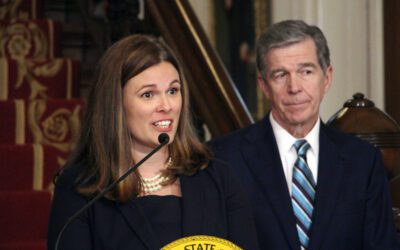
NC Supreme Court candidate Jefferson Griffin is asking the state's high court to overturn his 2024 election loss. (Photo via @officialjudgegriffin on Instagram)
Republican judge Jefferson Griffin’s controversial plea to throw out 60,000 votes—and make him the winner of the NC Supreme Court election—is sent back to state courts by a federal judge. Here’s what that means.
North Carolina’s state Supreme Court appears poised to decide if Republican judge Jefferson Griffin lost his election or not—even though multiple recounts have shown Griffin to have lost to Democrat Allison Riggs by more than 700 votes.
Read More: Opinion: Jefferson Griffin proves he isn’t fit to be on the NC Supreme Court
Multiple outlets reported Monday night that a Trump-appointed federal judge has passed the case back to the state courts. The state elections board could certify Griffin’s loss as soon as this week, though, meaning Griffin is hoping for the state Supreme Court to issue an injunction and quickly take up his case.
[UPDATE: The NC Supreme Court blocked certification of the election Tuesday afternoon and has agreed to hear Griffin’s protest in late January, according to NC journalist Bryan Anderson.
However, following an outcry from the public Tuesday, the court submitted a revised order, which appeared to show at least two Republican members of the Supreme Court are reluctant to throw out 60,000 votes. The order, among other things, included an uncommon dissent from conservative Justice Richard Dietz, who worried about the “incredible mischief” that Griffin’s case might invite if the court goes along with it. Dietz also called Griffin’s claims “almost certainly meritless.”]
View this post on Instagram
Griffin is asking the court he wants to join—which is also dominated by his political party—to throw out 60,000 votes, even though Griffin and Republicans haven’t proven that any of those voters are ineligible.
Advocates are pointing to this case as a major test for North Carolina democracy and judicial independence.
An N&O analysis of Griffin’s case found that Black voters were twice as likely as white voters to have their ballot challenged. He is challenging those voters for a number of reasons, but mostly because the voters’ registrations were missing some information in a state database, such as a Social Security number or a driver’s license number.
However, that doesn’t mean those voters, who had to show a voter ID before casting a ballot, aren’t eligible. The vast majority of these contested voters are likely eligible voters, and there are many valid reasons the information might be missing from the database, election officials say.
Stay tuned to Cardinal & Pine for updates.
View this post on Instagram

On North Carolina’s rivers and streams, the cleanup of Helene’s fury seems never-ending
How first Helene and then the cleanup battered the ecosystem in western North Carolina. Bracing himself against the current in waist-deep water,...
One year after Helene, NC program teaches students resilience
By Eric Tegethoff As the one-year anniversary of Hurricane Helene's devastating landfall approaches, a program in western North Carolina schools is...

Reduced fine for NC farmworker’s death raises accountability questions
By Eric Tegethoff During National Farm Safety and Health Week, a massively reduced fine for poor conditions that led to a farmworker's death...

Reduced fine for NC farmworker’s death raises accountability questions
By Eric Tegethoff During National Farm Safety and Health Week, a massively reduced fine for poor conditions that led to a farmworker's death...

Good News Friday: ‘Good Morning America’ spotlights North Carolina’s hurricane recovery efforts in Asheville
In this week's Good News Friday, we take a look at the "Good Morning America" visit to Biltmore to talk Helene recovery in Asheville, plus more good...







